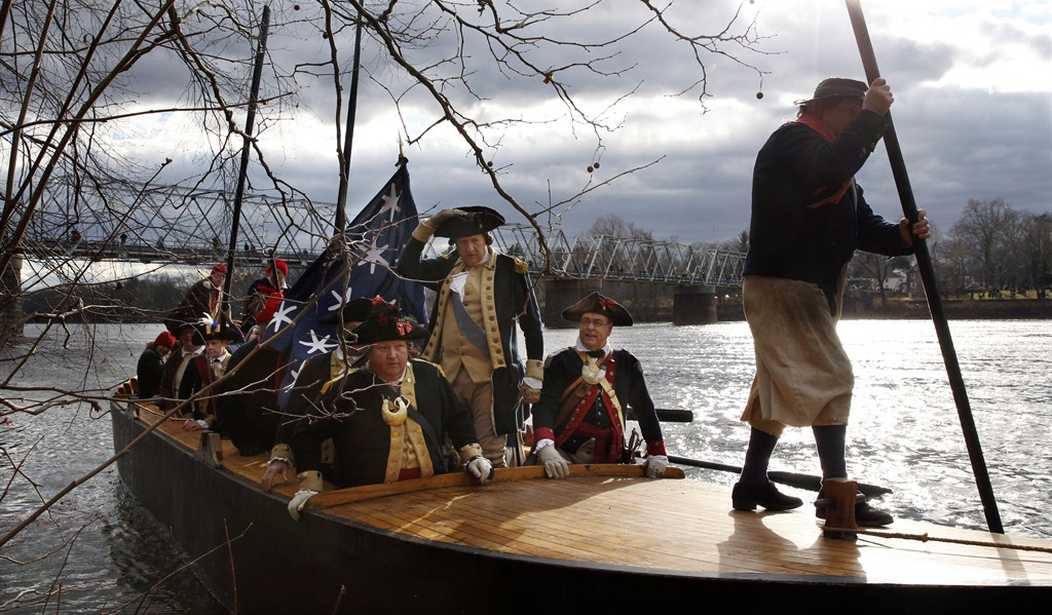The idea of the United States as an independent nation was saved by an unusual act on Christmas night in 1776. It was a battle, and, God in His providence helped America in one more step toward becoming free. Such was the belief of the leader of this effort.
George Washington faced a momentous task---to lead a ragtag army of farmers and merchants, armed with liberty in their hearts and a love for God and country, against the most formidable army and navy in the world at that time.
At the beginning of December 1776, things looked really bad for the American cause. Washington confided to his nephew, Lund Washington, just how bad things were.
He remarked in a letter dated December 10, 1776, "In short, your imagination can scarce extend to a situation more distressing than mine. Our only dependence now is upon the speedy enlistment of a new army. If this fails, I think the game will be pretty well up, as, from disaffection and want of spirit and fortitude, the inhabitants, instead of resistance, are offering submission."
His troops were reduced that year from around 20,000 to about 3,000. And even some of those 3,000 were tempted to quit. A betting man would have thought it was all over.
So, Washington decided to take a risky gamble. He led a surprise attack on Christmas night against a force of German mercenaries---a Hessian Army---that King George III had hired in the war. This became known as the Battle of Trenton, and it required Washington and his men to row across the Delaware River in the freezing ice.
Recommended
From this comes the iconic image of Washington crossing the frozen Delaware.
The story is told that a British sympathizer in Trenton became aware of the American plot, and wrote up a note warning the Hessian troops about it. The note is reported to have ended up in the hands of the commander, but he put it in his pocket to read later, and continued his drinking and his card games. Besides, it was Christmas night. Who would have an attack then? The Hessian commander died in the surprise attack.
But Washington didn’t stop there. He marched his troops onto Princeton, New Jersey, and soon successfully took on the British there also. Mount Vernon.com notes, “The American victory at the Battle of Princeton (January 3, 1777) was one of the most consequential of the American Revolution ….Washington's victory bolstered American morale and provided great confidence to his soldiers.”
The victories of Trenton and Princeton were important ones, not so much because they were strategic places in America, but to show that the Americans could beat the enemy after all. They led to more badly needed enlistments.
Six years later, on May 8, 1783, Rev. Ezra Stiles, the president of Yale College, gave a speech before the leadership of Connecticut. Keep in mind, here was a Christian headmaster addressing a Christian legislature. Note his reference to Biblical faith undergirding the American experiment.
Said the president of Yale: “All forms of civil polity have been tried by mankind, except one, and that seems to have been reserved in Providence to be realized in America.
“Our system of dominion and civil polity would be imperfect without the true religion; or that from the diffusion of virtue among the people of any community would arise their greatest secular happiness: which will terminate in this conclusion, that holiness ought to be the end [i.e., the goal] of all civil government. ‘That thou mayest be a holy people unto the Lord thy God.’”
Rev. Stiles continues, “In our lowest and most dangerous state, in 1776 and 1777, we sustained ourselves against the British Army of sixty thousand troops, commanded by...the ablest generals
Britain could procure throughout Europe, with a naval force of twenty-two thousand seamen in above eighty men-of-war.
“Who but a Washington, inspired by Heaven, could have conceived the surprise move upon the enemy at Princeton---that Christmas eve [sic] when Washington and his army crossed the Delaware?”
Christmas marks the birth of the Prince of Peace. George Washington regularly worshiped Jesus, and he faithfully discharged his duties of defending our country when needed, including on Christmas 1776.
Repeatedly, Washington saw the hand of God, whom he referred to 270 times as Providence (the God of the Bible who answers prayer), help the American cause. So much so that, at a different time, he wrote to one of his generals, “The hand of Providence has been so conspicuous in all this, that he must be worse than an infidel that lacks faith, and more than wicked, that has not gratitude enough to acknowledge his obligations.”
Our “obligations” to thank God for the hard-fought American freedom are still in force today.
Dr. Jerry Newcombe is the executive director of Providence Forum, a division of D. James Kennedy Ministries, where Jerry also serves as senior producer and an on-air contributor. He has written/co-written 33 books, including (with D. James Kennedy), What If Jesus Had Never Been Born? and (with Dr. Peter Lillback), George Washington’s Sacred Fire.

























Join the conversation as a VIP Member